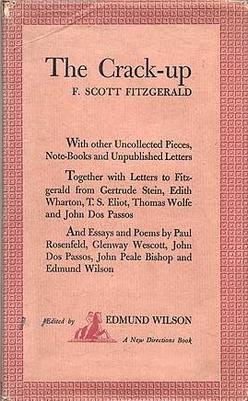This article needs additional citations for verification .(January 2010) |
 First edition cover | |
| Author | F. Scott Fitzgerald |
|---|---|
| Language | English |
| Genre | Essays, letters and notes |
| Publisher | New Directions |
Publication date | 1945 |
| Publication place | United States |
| Media type | Print (Hardback & Paperback) |
| Pages | 347 pp |
The Crack-Up is a 1945 posthumous collection of essays by American author F. Scott Fitzgerald. It includes three essays Fitzgerald originally wrote for Esquire which were first published in 1936, including the title essay, along with previously unpublished letters and notes. After Fitzgerald's death in 1940, Edmund Wilson compiled and edited them into an anthology that was subsequently published by New Directions in 1945.